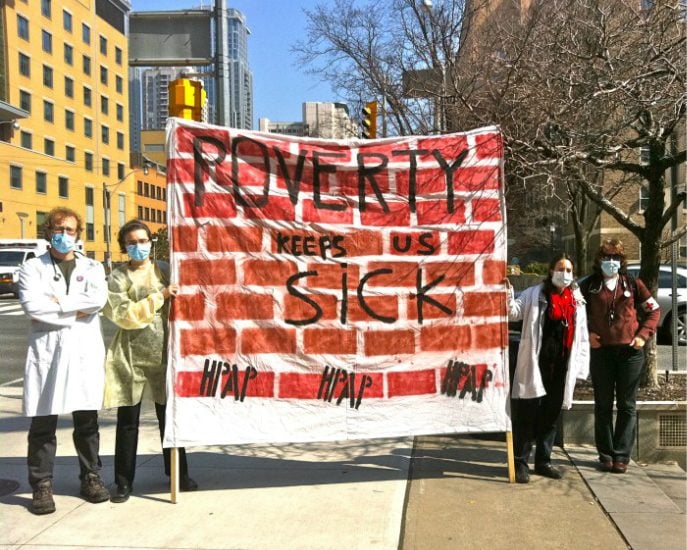KJIPUKTUK (Halifax) – Community Health Centres (CHC) in Nova Scotia are convinced that they have a lot to contribute to how primary healthcare is delivered in the province. They would like to do much more. But to do so the government needs to provide more stable funding.

Community Health Centres are not like your typical medical clinic. They offer services well beyond the typical fifteen minutes face to face with a doctor. Prevention is a priority, and they tend to think a lot about how social issues like poverty, racism, social isolation and housing contribute to you getting sick, and that in turn shapes the services they offer. They’re not for profit, and they’re truly rooted in the community.
See also: The social determinants of health in Nova Scotia. Part 1: Poverty makes you sick
We talked with Lorraine Burch, general manager of Our Health Centre,the CHC in Chester, and a board member of the Nova Scotia Association of Community Health Centres (NSACHC) about the Community Health Centre model and why getting stable provincial funding is important.
“We strongly believe that CHCs are part of the solution, because they know their communities best,” says Burch. “Each community has unique needs, and the people who are on the front line and in volunteer roles absolutely know what these needs in that community are, and they fight hard on behalf of those citizens.”
“In the CHC here in Chester we have five doctors and they are all on salary. Physicians tell us that in terms of family practice they want to come to a turnkey operation like the one we offer. They want to be a doctor, not a business person,” Burch says.
“That said, we opened our own walk in clinic on the second floor where doctors bill on a (traditional) fee for service basis. Even with the five NSHA doctors on the first floor there still are so many citizens who are on the waiting list for a physician.”
The need for stable funding
Most people in Halifax are no doubt familiar with the North End Community Health Centre, with a social worker on its team to help residents navigate income assistance and other supports, and with the wonderful people of Mobile Outreach Street Health (MOSH) who go out to where the people in need are.
There are over 20 community health centres much like the one in the North End, all meeting their specific local needs, across the province. Some are doing okay, for many others it’s a struggle to survive.
Many of the clinics are in rural Nova Scotia, some are in First Nation communities, others are associated with Women’s Resource Centres. They all receive project-based supports from the government, but to a large extent rely on community-based fundraising to keep going.
How the Chester CHC came to be is a good example.
“In 2005 people in the community realized they had to do something to attract doctors, so they built a tiny clinic, behind the current building, it housed a small blood clinic and a couple of doctors, and from there it just kept growing,” says Burch.
“Fundraising started in earnest in 2011, and the current CHC opened in 2016. It was a matter of people, movers and shakers, who said, we have to build it or it isn’t going to happen. $4.5 milion was raised, only $0.5 million was provincial money, and $250,000 was municipal. The rest was money from local citizens and businesses. A lot of the support was in kind, the land for instance was donated.”
Funding, or the lack of it, is a big issue. Some CHSs are doing well, others are struggling, and some end up not making it. The Rawdon Hills Community Health Centre, a wonderful place I reported on in 2013, was forced to close its doors in 2015.
“No CHC receives core funding from the government. We receive project-based funding from various departments, and we’re very grateful for that, but we don’t receive sustained funding,” Burch says.
“The NSACHC submitted a proposal to the minister of Health and Wellness in December of 2017. In it we talked about stabilization funding, to bring CHCs to point where they could exist, and move forward. `We haven’t had an audience with the minister yet. We kept in touch with the department, and we have invited the minister to our face to face meeting in June in Truro,” says Burch.
“The health system is the most complicated system in government, no matter what province you look at. We understand that it is complicated. The Nova Scotia Community Health Centres just want to be at the table, and be part of the solution, Burch says.”
The government responds
Stable base funding from year to year doesn’t appear to be in the works, as far as the province is concerned.
“Primary healthcare services provided by physicians are paid through MSI. Other primary health related services, such as nursing and social work, provided through collaborative family practice teams are funded through the Nova Scotia Health Authority (NSHA). Similarly, community health centres providing direct primary health care services may receive funding or have assigned staffing from the NSHA,” writes communications advisor Barbara MacLean of behalf of the Department of Health and Wellness.
“Depending on the services they provide they may receive grant or project-based funding from government. Project-based funding allows government to appropriately fund these organizations based on their approved activities.”
Oh, and that meeting with the Minister?
“The Minister’s office indicated that he is not scheduled to attend that event due to a scheduling conflict,” MacLean writes.
With a special thanks to our generous donors who make publication of the Nova Scotia Advocate possible.
Subscribe to the Nova Scotia Advocate weekly digest and never miss an article again. It’s free!



